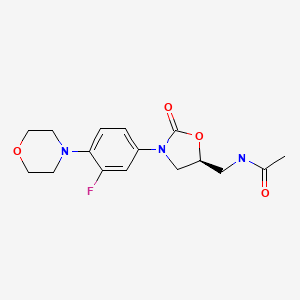CASRN: 165800-03-3

Drug Levels and Effects
Summary of Use during Lactation
Linezolid is excreted into breastmilk in concentrations likely to be effective against staphylococcal strains found in mastitis.[1-3] Limited data indicate that the maximum dose an infant would receive through breastmilk would be only 6 to 9% of the standard infant dose and that resulting infant serum levels are trivial. If the mother requires linezolid, it is not a reason to discontinue breastfeeding. Monitor the infant for possible effects on the gastrointestinal tract, such as diarrhea and vomiting.
Drug Levels
Maternal Levels. A 32-year-old lactating woman was given a single dose of 600 mg of linezolid orally. Milk samples were taken at 10 time points over the next 24 hours. The peak concentration of linezolid in breastmilk occurred 2 hours after the dose with a value of 12.4 mg/L. Milk concentrations fell with a half-life of 6.5 hours and were detectable up to 24 hours after the dose.[2] Using the peak milk level data from this patient, an exclusively breastfed infant would receive an estimated maximum of about 2 mg/kg daily with the maximum recommended maternal dosage. The established maximum dosage of linezolid for infants is 30 mg/kg daily.
A woman was given oral linezolid 600 mg every 12 hours for methicillin-resistant Staph. aureus mastitis. She pumped milk from both breasts 8 times daily on days 1 and 14 of therapy. Peak breastmilk linezolid levels were 9.75 mg/L on day 1 and 18.73 mg/L on day 14. The authors calculated that a fully breastfed infant would receive 7.85% of the weight-adjusted maternal dosage on day 1 and 15.61% on day 14. Using the average milk level on day 14, a fully breastfed infant would receive a dosage of 1.84 mg/kg daily, which is less than the maximum dosage of linezolid for infants of 30 mg/kg daily.[3]
A woman taking linezolid 600 mg orally every 12 hours donated breastmilk samples at various times over a 24 hour period after about 45 hours after the first dose. Breastmilk linezolid levels ranged from 3.5 to 12.2 mg/L, with the highest level shortly after a dose and the lowest shortly before the following dose.[4]
Infant Levels. A random blood sample was taken from a breastfed (extent not stated) infant about 3 to 4 hours after a maternal dose and found to contain <0.2 mg/L of linezolid, although the time of the previous breastfeeding was not known. A breast milk sample obtained 1 hour after the infant's serum sample and 4 hours after linezolid administration was 8.9 mg/L.[4]
Effects in Breastfed Infants
Relevant published information was not found as of the revision date.
Effects on Lactation and Breastmilk
Relevant published information was not found as of the revision date.
Alternate Drugs to Consider
(Methicillin-resistant Staph. aureus) Doxycycline, Minocycline, Trimethoprim-Sulfamethoxazole, Vancomycin
References
- 1.
- Delgado S, Arroyo R, Jimenez E, et al. Staphylococcus epidermidis strains isolated from breast milk of women suffering infectious mastitis: Potential virulence traits and resistance to antibiotics. BMC Microbiol 2009;9:82 [PMC free article: PMC2685400] [PubMed: 19422689]
- 2.
- Sagirli O, Onal A, Toker S, et al. Determination of linezolid in human breast milk by high-performance liquid chromatography with ultraviolet detection. J AOAC Int 2009;92:1658-62 [PubMed: 20166583]
- 3.
- Rowe HE, Felkins K, Cooper SD, et al. Transfer of linezolid into breast milk. J Hum Lact 2014;30:410-2 [PubMed: 25098610]
- 4.
- Lim FH, Lovering AM, Currie A, et al. Linezolid and lactation: Measurement of drug levels in breast milk and the nursing infant. J Antimicrob Chemother 2017;72:2677-8 [PubMed: 28541475]
Substance Identification
Substance Name
Linezolid
CAS Registry Number
165800-03-3
Drug Class
Breast Feeding
Lactation
Milk, Human
Anti-Infective Agents
Anti-Bacterial Agents
Disclaimer: Information presented in this database is not meant as a substitute for professional judgment. You should consult your healthcare provider for breastfeeding advice related to your particular situation. The U.S. government does not warrant or assume any liability or responsibility for the accuracy or completeness of the information on this Site.
Publication Details
Publication History
Last Revision: July 15, 2024.
Copyright
Attribution Statement: LactMed is a registered trademark of the U.S. Department of Health and Human Services.
Publisher
National Institute of Child Health and Human Development, Bethesda (MD)
NLM Citation
Drugs and Lactation Database (LactMed®) [Internet]. Bethesda (MD): National Institute of Child Health and Human Development; 2006-. Linezolid. [Updated 2024 Jul 15].